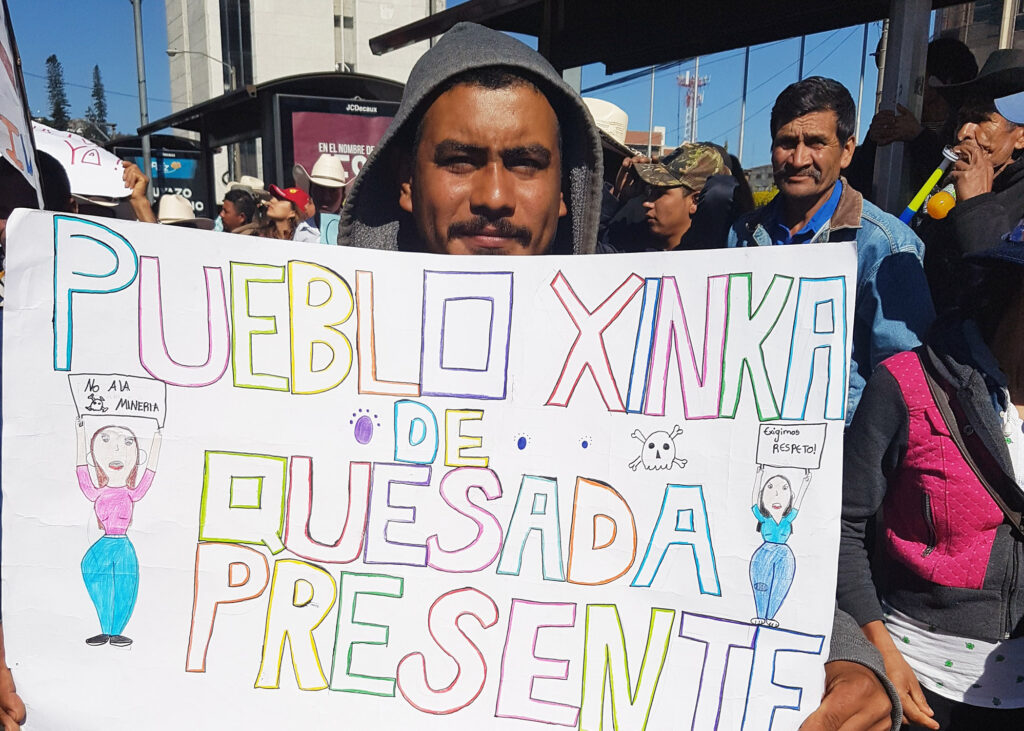In September of 2018, Guatemala’s highest court ordered the Ministry of Energy and Mines to consult with the Xinka people after finding that the government had discriminated against them and violated their rights when the Escobal mine was violently forced into production in 2014. Last month marked the end of the first phase of the process.
As Xinka Parliament President Aleisar Arana explained during a July 21 press conference, “The eight meetings held so far built the foundation for the next step, which is the most important, during which the Xinka People will receive all of the information about the Escobal mining project. This information will be analyzed by our trusted experts who will provide us simplified information to be shared with our communities. After this we will be able to begin the consultation.”

Since day one, the Xinka people have had to fight for full participation and respect for their rights during the court-ordered consultation process. With support from a region-wide resistance movement which has maintained two around-the-clock protest camps on either side of the mine site since June 2017, the Xinka demanded, and eventually secured, accreditation of their 59 representatives to participate in the consultation process. The Xinka also required the government to fund a cultural and spiritual study carried out by an expert of the Xinka people’s choosing prior to beginning the process. The study examines the impacts of the mine on Xinka spirituality and traditions, issues that weren’t considered prior to the permitting of the mine, now owned by Pan American Silver.
With the study in hand the Xinka Parliament will now begin sharing the results with Xinka communities in the mine’s area of influence in Santa Rosa, Jalapa and Jutiapa through local meetings and assemblies. “The cultural and spiritual study will be analyzed and used to complement the information [from the government and Pan American Silver],” President Arana explained. “We’ll compare it with the studies provided by the government to see if we agree.”
Despite this important advancement, Xinka leaders and members of the larger resistance involved in the consultation process continue to face persistent acts of intimidation, attacks and criminalization.
In May, local activists and delegates from Argentinian communities impacted by Pan American Silver were followed by a truck believed to belong to the mining company.
After a June meeting, Xinka Parliament staff were trapped inside their office while gunshots rang out until 11pm. Meanwhile, there have been no arrests made in the attempted assassination of community leader Julio González, and a wave of threats against other activists in 2021. Impunity for past crimes against people opposing the Escobal mine contributes to insecurity for residents and increases the risk of future violence and human rights abuses. Additionally, the Xinka Parliament warned that Pan American Silver’s ongoing community relations programs contribute to tension in the region and undermine the integrity of the process.
While both the Guatemalan Ministry of Energy and Mines and the Xinka Parliament provided assurances that the process is moving forward, there are troubling indicators that the government and Pan American Silver may not respect the Xinka people’s right to self-determination. In their remarks at the July press conference, the Minister of the Ministry of Energy and Mines stated that the government, not the people, have the final say about the reactivation of the Escobal mine. Xinka President Arana, however, emphasized that through the process the Xinka people were informing themselves and their communities in order to exercise their self-determination, specifically their right to free, prior and informed consent.
A key factor in the Xinka people’s ability to fully participate in the consultation process is the amount of time they have to gather, review, generate and share the information necessary to ground their decision. While Xinka leaders have made clear that February 2023 is the tentative date for the completion of the consultation process, the actual timing will depend on Xinka worldview and the needs of communities.
“We know we can’t make a decision if we aren’t informed,” President Arana said. “Information is fundamental and it is one of the principles in international standards. Another vital thing is that it must be free, without pressures from any party in order to make good decisions and not feel like we are being told what we have to do. It must be the decision of those who are being consulted.”
Earthworks will continue to support Xinka communities as they navigate the consultation process to ensure international standards are upheld. Join us! Sign the petition to demand Pan American Silver and the Guatemalan government respect Xinka self-determination.

